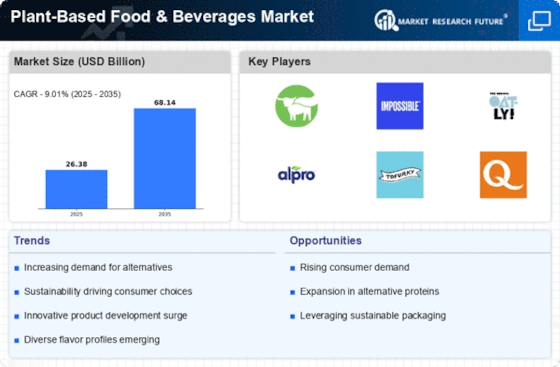Top Industry Leaders in the Plant-Based Food & Beverages Market
 The competitive landscape of the Plant-Based Food & Beverages market reflects a rapidly evolving industry responding to increasing consumer demand for sustainable and plant-derived alternatives. Key players in this market.
The competitive landscape of the Plant-Based Food & Beverages market reflects a rapidly evolving industry responding to increasing consumer demand for sustainable and plant-derived alternatives. Key players in this market.
- Tyson Foods Inc (Arkansas)
- Danone SA (France)
- Nestlé S.A. (Switzerland)
- General Mills Inc. (US)
- Clara Foods (US)
- Keystone Natural Holdings (US)
- Premier Foods Plc (UK)
- Del Monte Fresh Produce NA Inc. (US)
- Amy’s Kitchen (US), among others
Strategies adopted by these key players encompass product innovation, branding, and marketing efforts to differentiate themselves in a crowded market. Introducing unique and appealing plant-based products, investing in sustainable packaging, and leveraging celebrity endorsements have been common strategies to enhance brand visibility and attract a broader consumer base. Companies also engage in strategic acquisitions to expand their product portfolios or acquire innovative technologies that give them a competitive edge.
Market share analysis in the Plant-Based Food & Beverages industry involves evaluating various factors. Product quality, taste, pricing, and effective distribution channels are critical determinants of market share. Companies often conduct market research to understand consumer preferences, enabling them to tailor their products to specific target audiences. Additionally, strong relationships with suppliers are vital to ensure a stable supply chain, supporting the demand for plant-based ingredients.
New and emerging companies are continually entering the Plant-Based Food & Beverages market, driven by the growing popularity of plant-based diets. These companies often focus on niche markets or specific product categories, seeking to capitalize on trends such as gluten-free, organic, or locally sourced plant-based alternatives. Their agility and ability to quickly adapt to changing consumer preferences contribute to the overall dynamism and competitiveness of the industry.
Industry news and updates play a significant role in shaping the competitive landscape. Regular announcements of product launches, partnerships, and expansions provide insights into market trends and the strategies adopted by key players. Companies that stay informed about industry news can position themselves strategically to respond to changing market dynamics and consumer demands.
Investment trends in the Plant-Based Food & Beverages market underscore its growth potential. Investors are keenly interested in companies that demonstrate a commitment to sustainability, innovation, and market expansion. Funding is often directed towards research and development activities to improve product formulations, enhance production efficiency, and address environmental concerns. Infrastructure development, including manufacturing facilities and distribution networks, is also a focus for companies looking to scale their operations and meet growing demand.
The overall competitive scenario in the Plant-Based Food & Beverages industry is characterized by intense rivalry among key players. While some companies compete on pricing and broad market presence, others differentiate themselves through product innovation and a focus on specific consumer segments. Regulatory compliance and transparent labeling are becoming increasingly important factors for companies looking to build consumer trust in a market that is becoming more scrutinized.
Notable developments in the Plant-Based Food & Beverages market include advancements in plant-based meat alternatives. Key players have invested in technologies that replicate the taste and texture of traditional meat products, catering to consumers who seek plant-based options without compromising on sensory experiences. Additionally, several companies have announced partnerships with agricultural producers to ensure a sustainable and secure supply of plant-based ingredients. These developments signal a market that is not only expanding but also maturing in terms of product offerings and sustainability considerations.

- Beta
Beta feature










